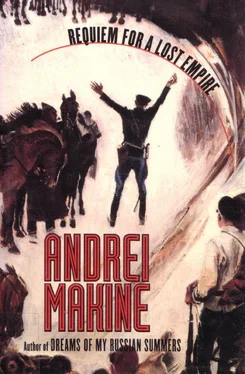This involuntary betrayal seemed to have no consequences. There continued to be cities that emptied at the sound of the first gunfire, as if at the drumming of the first spots of rain on a corrugated tin roof. (One day, as the westerners were hurrying off toward the aircraft in a rainstorm of great warm drops, their dread of the bullets beginning to reach the fringes of the airport was comically confused with their eagerness to protect themselves from the downpour.) There were ships maneuvering ponderously in bays that were too narrow and heading toward the open sea so slowly that we thought we could picture the rage of the passengers, glaring hard from the deck at the coastline already going up in flames, as if to push it away. We would stay. We knew that, after the fever of the fighting and the looting, the conquerors would be in need of diplomatic recognition, money, arms. At such times one could obtain results within a few weeks that in normal times would take years of work. The only difficulty was staying alive.
Nothing changed. Least of all the impression that dogged us in our rapid transits from Europe to Africa. Everything that in the North was words, discreet consultations, slow approaches to a key person, turned in the South into cries of pain, the whistling of bullets and bitter hand-to-hand fighting, as if a horrible, unbridled process of translation had become established between these two continents.
And yet it was in Africa that one day I again felt as if I were hiding from you what I could perceive more and more clearly: the end.
Two months after the conclusion of hostilities they arrived to take charge of the network following our departure. We were struck by their youth, like a reminder of ourselves several years previously, at the time of our first meeting in Berlin. What touched us as well was that they had cheerfully told us their actual first names, which had the comic assonance of the masculine and feminine variants: Yuri and Yulia. We were not used to confidences of this type, our own lives being confined to our borrowed identities. At the moment of going away you had a preoccupied air, like a mother anxious to forget nothing when she leaves the children on their own. They were to renew contact with us in Milan three months later. They did not come. We spent four days waiting for them. The Center spoke of a canceled mission. Shakh, whom I managed to contact in the United States, was perplexed, like a chess player robbed of a pawn and on the verge of discovering he has been cheated. He gave us the order to return to Africa. We found our old house without any trace of a forced departure or search. The tranquillity of the rooms had the sly alertness of a trap. The Center's response was as muddled as before. What this opacity signaled was no longer just a simple setback but a more wide-ranging collapse. An end. I decided to talk to you about this, then changed my mind. Out of cowardice, no doubt. Once again I felt I inhabited the skin of that soldier who, in the furthest outpost of an empire, is the first to learn the news of defeat and makes his escape without warning the last remaining fighters. Moreover, we knew what prison and torture could mean in countries like this in wartime. Especially for a woman. Yulia and Yuri…
The resumption of fighting dispelled these feelings of remorse in us. The city was bombed, we left the house and spent a long inconclusive day in one of the big hotels in the capital, abandoned by the westerners, looted, refurbished during the months of truce, and once more derelict. We were still hoping we could remain in the city. The bedroom had been made up a few days previously and it was eerie to see the bed with the sheets straightened and turned down by a professional hand, the little "do not disturb" card on the door and to know that the walls of the corridor were spattered with blood in several places and that in the foyer on the floor below prisoners had been tortured and raped. Now the hotel stood empty and through the window at the end of the corridor one could see the sea, dominated by the gray, asymmetrical shape of an American aircraft carrier. Its vast bulk-it looked as if it had been carved out of a monstrous bluish muscle-seemed to be blocking all movement of waves upon a flattened, slack sea.
One section of the troops defending the city had been driven back toward the coast, the soldiers took up a position on the first floor of the hotel, the impending victors surrounded the building, machine-gunning the windows in the expectation that the smoke would drive the besieged men out into a hail of bullets. We had time to cross the hotel garden, to skirt its little marina, and to reach the edge of the water. We knew that a boat would be evacuating the last of our military instructors. Out of breath, we stopped in the middle of the little beach where you could still see rows of white plastic beach chairs. And at that moment time was shattered, went into turmoil- a sequence of mad dashes and complete standstills. The sand ensnared our footsteps, as in a bad dream where running is impossible. The military vehicle that pulled out from beside the hotel building grew rapidly larger, bearing down on us, and already the first bullets were riddling the hulls of the dinghies upended on the sand. My shout was cut short and had no effect on you. You remained standing, your hand raised in a gesture of greeting that seemed to me absurd. The magazine slithered in my grasp like a piece of wet soap. As I fired I thought I was aiming at the vehicle's scowling face-the evil grin of the radiator grille and the dull eyes of the headlights.
Dazed by my fear, I saw the shadow before I heard the noise. For a moment it blotted out the sun above my hiding place behind the boats. I raised my head. Its outline was very easy to recognize: an Mi-24, the combat helicopter used by the empire on all continents. I detected the movement of its two guns-and almost immediately, in the area of the vehicle that was now only a few dozen yards away, there was a ball of fire from the explosion. The machine landed, covering us with a whirlwind of sand and uprooting the straw parasols around the hotel swimming pool. Its steely ponderousness contrasted jarringly with this little tropical tourist paradise. As I climbed in, I saw on its fuselage the traces of direct hits, some hidden under a layer of gray-green paint, other, more recent ones showed a glint of bare metal. The blast from the takeoff flung the parasols around, likewise a blue sheet beside the pool, and outside the window the beach, the sea, the hotel building, which was already engulfed in smoke, were rapidly thrust back. I tried not to think about the people inside, surrounded and still fighting.
On the deck of the ship where we landed it was the red flag of the empire that caught our eye. And also the tired paint covering its contours of steel. In heading for clear water, the ship was obliged to cross the inner sea marked off from the boundless ocean by the presence of the American aircraft carrier. This vast yet closed-in expanse was defined by the escort frigates. We advanced slowly, as if feeling our way, although in brilliant light. On our left the aircraft carrier grew larger, dominated us, flattened us on the surface of the water. It seemed to be ignoring us. A plane took off, forcing us to cover our ears, another landed on the deck, mastering its terrible energy in a few seconds. Simply by their positioning the escort vessels indicated the fine dotted line of the course we were authorized to take.
"It's like being on the battleship Potemkin confronting the government squadron," you said, your eyes laughing in a face smudged with black.
That may have been the last time in our lives I saw you smile.
I saw Shakh a month later in a big German city where everything was ready for the Christmas holiday. He entrusted some documents to me that I was to pass on to a contact agent, made jokes about the change in climate that I must have noticed and about the very German seriousness of the holiday preparations. I guessed what a man of his age might feel in the midst of the festive animation in this city, in this country where, as a young man, he had fought in the war. He fell silent, sunk in that past, then returned to the memory that prevailed over all others and talked again about the Rosenbergs. I noticed now that the lines of his face had become more angular and that his shoulders remained slightly raised, as if by a self-imposed physical discipline. Listening to him, I did not say to myself, "He's rambling…" but rather, "His is a totally different generation! One that can't see, or doesn't want to see, that we've moved into a new age." What was most surprising was that, in spite of myself, I saw you as belonging to the same generation, even though Shakh could have been your father. Age in years had nothing to do with it. Yours was the generation who… I suddenly grasped it with perfect clarity: a generation who did not believe it was the end. The end of the empire, the end of its history. And that this history and the men of this history would be forgotten.
Читать дальше










